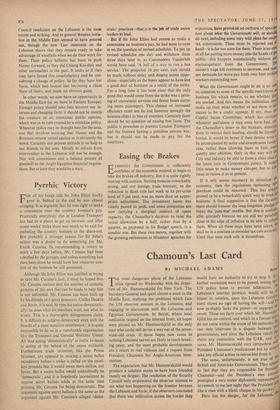Pyrrhic Victory
FOR all his tough talk. Sir John Elliot finally gave in. Indeed in the end he was almost cringing. It is arguable that he was right to make a concession over the country busmen's pay. Practically everybody else in London Transport has had or is about to get an increase, and after seven weeks' strike there was much to be said for including the country busmen in the share-out. But probably a stronger reason for Sir John's action was a desire to do something for Mr. Frank Cousins. In recommending a return to work a few days before, Mr. Cousins had been rebuffed by the garages, and unless something had then been done he would have lost whatever con- trol of the busmen he still possessed.
- Although Sir John Elliot was justified in trying to save Mr. Cousins's face, it must be hoped that Mr. Cousins realises that the number of quixotic gestures of this sort that can be made to help him is not unlimited. Mr. Cousins has been built up by his friends as a great democrat. Unlike Deakin and Bevin, it is said, he runs his union democratic- ally; he does what his members want, not what he wants. This is a thoroughly disingenuous claim. It is difficult to achjeve democracy even with the benefit of a most sensitive constitution : it is quite impossible to do so in a ramshackle organisation like the Transport and General Workers' Union. All that acting 'democratically' is liable to mean is acting at the behest of the union militants. Furthermore trade unionists, like the Prime Minister, are opposed to making a secret ballot mandatory before a strike is called on the excel- lent grounds that it would mean more strikes, not fewer. But a secret ballot would undoubtedly be 'democratic'; and it is hopelessly inconsistent to oppose secret ballots while at the same time praising Mr. Cousins for being democratic. The argument against secret ballots is the same as the argument against Mr. Cousins's alleged 'demo- °rade' practices—that it is the job of trade union leaders to lead.
But if Sir John Elliot had reason to make a concession on busmen's pay, he had none to cave in on the question of revised schedules. To pin up revised schedules one day and withdraw them three days later is, as Commodore Vanderbilt would have said, 'A hell of a way to run a bus service.' The projected 10 per cent. cuts should be made without delay and despite union oppo- sition—especially as the buses appear to have lost a good deal of business as a result of the strike. For a long time it has been clear that the only good that would come from the strike was a prun- ing of unessential services and fewer buses carry- ing more passengers. This chance of increased efficiency must not be lost however strongly the busmen object to loss of overtime. Certainly there should be no question of raising bus fares. The public is powerless to prevent London Transport and the busmen having a pointless private war, but it should not be made to pay for the hostilities.


































 Previous page
Previous page